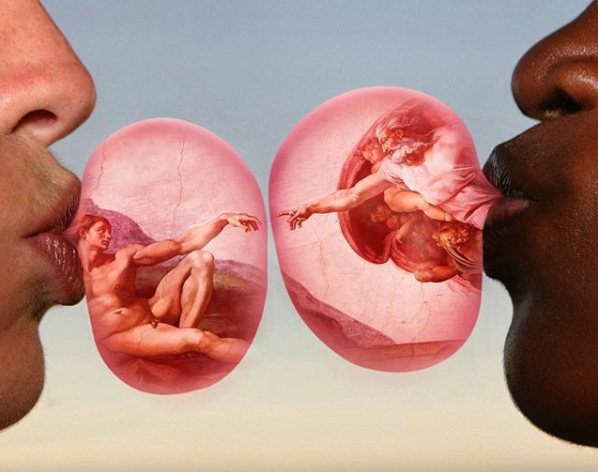From CBD to Forest Bathing, These Five Practical Wellness Trends Are on the Rise

Wellness is a loaded term. At its core, it’s an active process of making choices toward a healthy and fulfilling life—or as Dan Rather brilliantly put it in 1979 when speaking about “a word you don’t hear every day”—it’s the opposite of illness (mind = blown). But in 2019, wellness is a word we hear every day—numerous times over. It yells at us from a $10 bag of grain-free paleo granola at the grocery store, nudges us from an air plant adorned Pilates studio on a trendy street, and of course, crowds our feed online in the form of listicles and articles—like this one! Of course, we can blame everyone’s favorite scapegoat Gwyneth Paltrow for the demise of not-illness-wellness, but perhaps it’s better to start reclaiming the word instead. To get that started, here are five actionable wellness trends to make this year, and the ones to come, your best yet—no jade eggs involved.
Nature: Prescribed
Japanese people are among the healthiest in the world. They rank highest in life expectancy, living an average of 84.2 years as of 2018, and boast over two million individuals over the age of 90 in the country. Certainly, many factors contribute to these impressive milestones—diet and lifestyle key among them—but the Japanese government also invests in its people’s wellness. Healthcare is affordable and accessible, and there is a surprisingly simple yet effective program in place that has recently picked up traction in the United States. Officially called Shinrin-yoku Forest Therapy, it is the act of being out in nature, and having that be your medicine. Shinrin-yoku translates to “taking in the forest atmosphere” or “forest bathing” and was developed in Japan during the 1980s.
Since then, it has become a cornerstone of preventive health care in Japanese medicine and is scientifically backed. A 2015 Stanford University study found that being immersed in nature can lower heart rate, blood pressure, and cholesterol levels, and reduces risk for coronary heart disease and type 2 diabetes. To this point, there are even doctors who are prescribing nature for their patients.
Make Meaningful Connections

Don’t smoke, don’t overeat, exercise. When it comes to wellness these are the key three, the no-brainers drilled into us during the formative years and reaffirmed strongly ever since. More get added as we age—don’t drink in excess, sleep—but studies trying to determine what factors affect life expectancy offer unexpected results.
“There was a study that tracked 7,000 people for ten years and tried to determine what variables that were present on day one that could predict, in the strongest way, when people would die or fall ill, and smoking was number three, which was a quite surprise,” says Dr. Eric M. Verdin, the President and CEO of the Buck Institute for Research on Aging. A native of Belgium, Verdin holds a Doctorate of Medicine from the University of Liege and has had additional clinical and research training at Harvard Medical School. “The most important variable was loneliness and the relationship with first degree relatives or friends,” he adds. Meaning, if you’ve been thinking of that friend you’ve been meaning to call, pick up the phone now.
This notion is supported by the American Psychological Association, who insist that loneliness is now a bigger public health threat than obesity. Another important factor to a long, healthy life was having a sense of purpose, the feeling of being helpful to your community and being important to someone in the world. “These are interesting because everybody wants a drug. But the results are saying, ‘You don’t need a drug. Go volunteer at the library.’ This would help a lot more than giving you medicine.”
Jump on the CBD Wagon
You can get a shot of it in your coffee—typically about $4 a pop—feed treats infused with it to your dog, and it’s the gateway weed du jour for your mom. That’s right, it’s CBD. Credited for everything from alleviating anxiety to improving sleep and relieving chronic pain, this non-psychoactive cannabinoid is flooding the market in the form of tinctures, balms, edibles and beyond. But is the hype worth it? Many experts and nutritional industry vets say yes.
“Navitas has been a big believer in the power of hemp—we’ve produced and sold hemp seeds and powder for nearly a decade,” says CEO Zach Adelman, who founded the company in 2003. “We saw an opportunity to further explore the many benefits of this incredible plant once the 2018 Farm Bill passed, allowing us to add hemp-derived CBD to our growing superfood portfolio.” The company recently released a series of superfood wellness shots with 20mg of hemp CBD—the four varieties intend to help consumers regain focus and restore, rejuvenate and diminish other ailments. “We’re really excited to help educate consumers as they navigate the incredible benefits of CBD,” Adelman continues. “We’ve done extensive research, from sourcing of ingredients, including hemp CBD, to helping consumers understand how CBD can address stress, anxiety, and inflammation.”
Insect-based Food

People can’t seem to get over making fake meats. Even Burger King, which still claims it’s Whoppers are 100% beef, is currently testing a plant-based Impossible Whopper. While moves like this are definitely in the right direction, there are other ways to eat well, respect your body and also respect the planet. More nutritious than any sodium-laden imitation duck, crickets are full of micronutrients and healthy fats and are some of the most sustainable and water-efficient sources of protein on the planet. Understanding that the act of eating bugs isn’t appealing to most, over the past decade, companies have made strides to make the concept of eating insects easier to digest—most crickets found on shelves these days are in flour form.
Are they selling? Apparently so. Ask the millennials, they get it. Although it’s contested, crickets are also a great choice for another specific group, says Leslie Ziegler, co-founder of Bitty Foods. “We actually have a lot of vegetarian customers, simply because they have such a hard time getting protein in their diets.” The main selling point for a lot of vegetarians and vegans is the bioavailability of vitamin B12 that is available naturally in insects like crickets. Nutrients aside, according to reports published by the United Nations Food and Agriculture Organization, edible insects may be the key to stabilizing the global food supply, so people warming to the idea of consuming them is a good thing.
It’s in the Blood
All of us have two different ages, a biological age and a chronological age. While chronological age is how long we’ve lived in years, biological age is based on molecular and cellular health. And when it comes to illness, age is a risk factor. In fact, according to the National Center for Biotechnology Information, age the main risk factor for the prevalent diseases of developed countries: cancer, cardiovascular disease, and neurodegeneration. Biologically, everyone ages at a different rate and thanks to recent medical advances, the rate of aging can actually be measured.
Curious about yours? A company named myDNAge sells a kit that can provide you the magical numbers. “It’s still very experimental, so we don’t really fully know what to do with these numbers,” says Dr. Eric M. Verdin. So why should you bother taking the test at all? “The prediction is that if you’re doing this, you’re going to be able to identify who’s at risk for early aging or faster aging and who is actually doing well. The importance of this is that within the next five to 10 years there will be drugs that change the rate of aging, and if you were to undergo this blood test and they would say that you’re at risk for accelerated aging, you would become a candidate to foreign intervention.”
You heard that correctly, pills that slow the aging process will be available in the next decade. “There are a number of drugs that we know now that increase healthspan and lifespan and animal models,” Verdin continues. “The basic research of aging has been going on for close to 30 years and we’re right at that transition where all of these discoveries are starting to be tested in the clinic.”
Art by @artfucker
Gain Clarity for the Future. Your 2026 Tarot Reading features a 13-card spread revealing monthly themes, lessons, and breakthroughs for the year. Find empowerment and direction.



